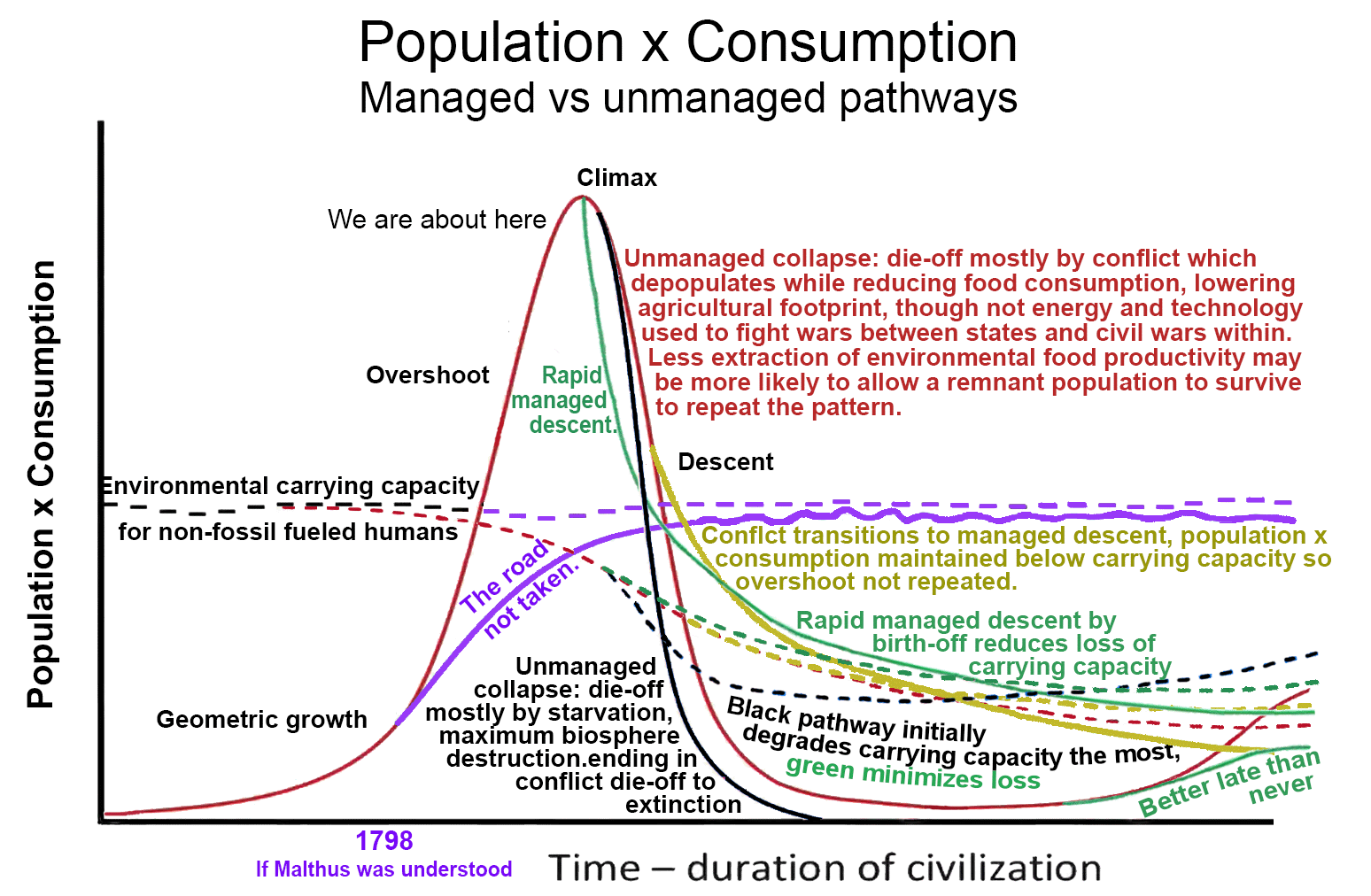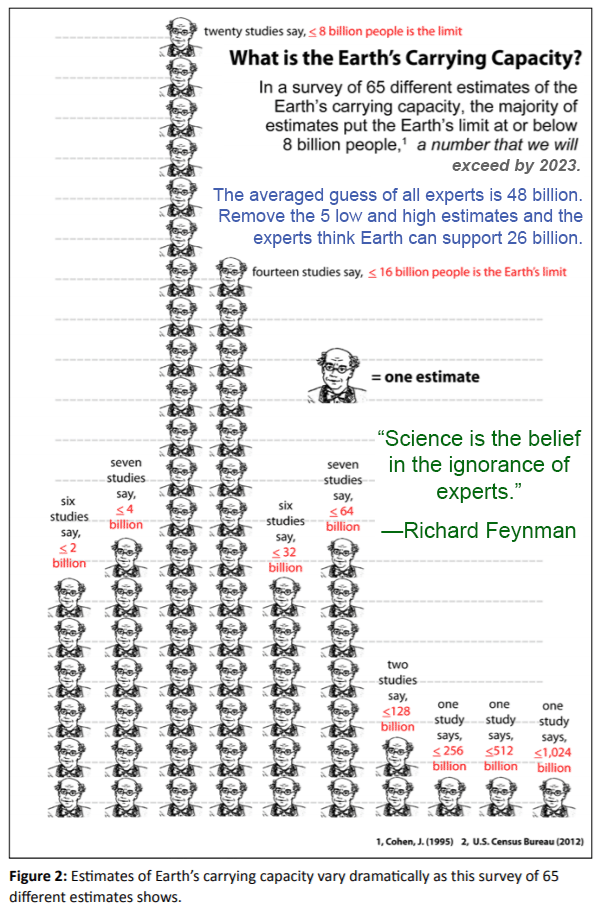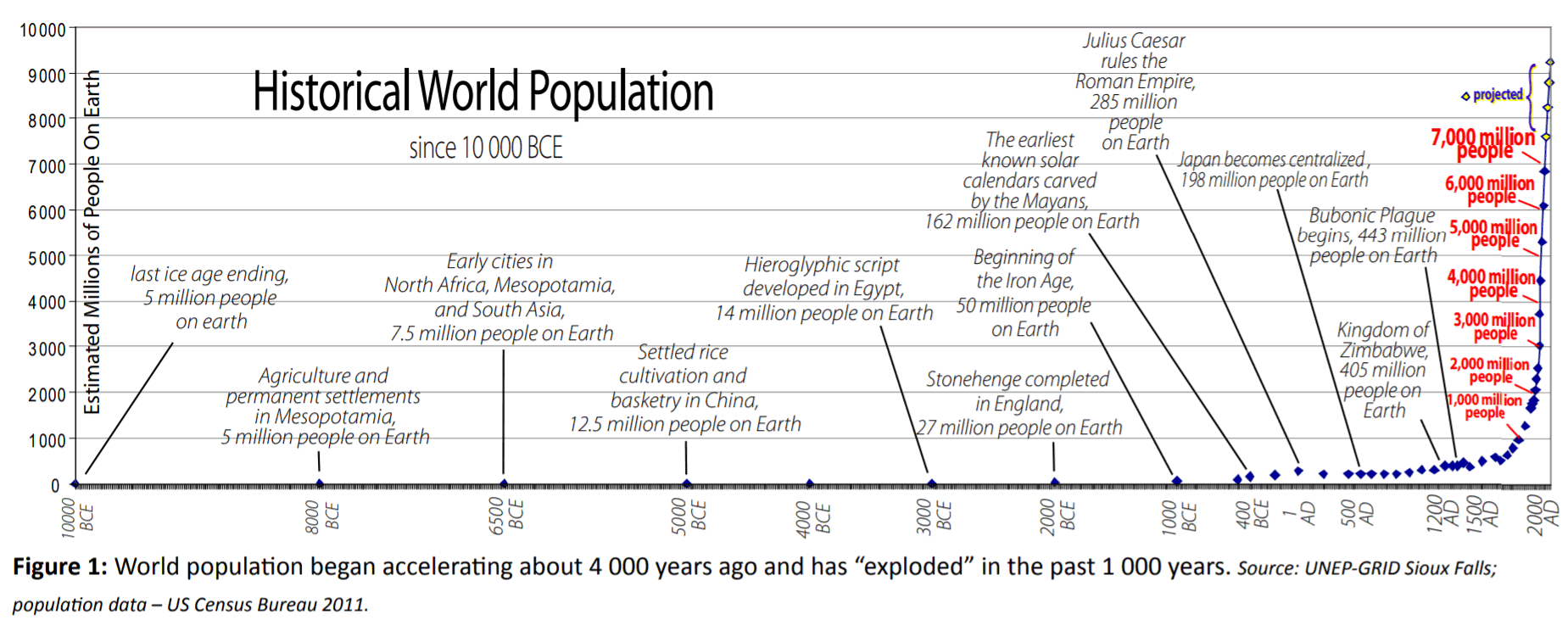
SUNDAY, FEB 14, 2021: NOTE TO FILE

Population x Consumption
Managed vs unmanaged pathways
"The world has enough for everyone's need, but not enough for everyone's greed." —Gandhi
In a time of universal denial and deceit — telling the truth is a revolutionary act. — George Orwell might have said something like this, but didn't.
A 2012 UN report summarised 65 different estimated maximum sustainable population sizes. The most common estimate was eight billion, a little larger than the current population. But the estimates ranged from as few as two billion to, in one study, a staggering 1,024 billion.
Eric Lee, A-SOCIATED PRESS
TOPICS: OVER, FROM THE WIRES, GROWTH
Abstract: Our trajectory and problematique boils down to basically two future pathways, and illimitable growth is not one of them: a managed vs unmanaged descent followed by a managed vs unmanaged pulsing pathway. Unmanaged may result in our extinction or, after a period of recovery, our repetition of the pattern of overshoot and collapse. Managed descent would maintain our population and per capita consumption well under a maximum carrying capacity to avoid collapse, the repeating of an unsustainable overpulsing unto overshoot.
COOS BAY (A-P) — Our recent trajectory is one of increasing population and per capita consumption of resouces using technology and desposal of waste products in excess of what can be absorbed, e.g. N, CO2. We received our 'Huston, we have a problem' call from Thomas Malthus in 1798, who kept repeating it until 1834 because his basic concern seemed not to go away because almost everyone else agreed to deny with extreme desceit that human overgrowth was possible or of concern. Others have continued to give warnings. Maybe overshoot and collapse could happen to reindeer or yeast, but not to humans.

The concepts of ecological carrying capacity and overshoot are widely misunderstood from 'not quite' understood to 'facepalmingly delusional'. A question on Quora, 'What is Earth's human carrying capacity?', currently has 74 answers with 315 comments. But if you want to know enough to understand the graphic above, consider reading 'Carrying Capacity and Overshoot: The objective view' first. For mostly subjective views, there is Quora (and tavern talk, internet buzz, mainstream/social media, pulpits/lecterns, most academic journals).
We went into overshoot long before 1970 when our population was 3,700 million. The lowest number of humans Earth can support that any public intellectual now gives is 2,000 million, but in private, 500 million may be closer to a consensus view among human ecologists and population biologists who don't believe in fossil-fueled progress transitioning to some illimitable evermore. Most Quora experts are certain humans have no overpopulation problem, and most of the rest agree that the demographic transition will take care of any issues and more than a few are deeply concerned that there could soon be severe underpopulation problems that will threaten the economy. As Richard Feynman noted, 'Science is the belief in the ignorance of experts.'
The human population reached 500 million in 1650. That the low number that can be mentioned in public without being dismissed as insane (a doomer) is 2 billion is because all global thought-leaders within the science literate community agree (or editors agree) to not mention lower numbers. A consensus has arisen that 2 billion is the lowest number anyone who is right thinking and responsible can believe. So for tactical reasons scientists who think way less will agree to 2 billion to be numbered among responsible public intellectuals (per current consensus) and thereby be given a forum. Getting people to be more numerate can wait (maybe).

Cited by authoritative BBC article in 2016.
If you think Earth can support 2 billion humans as the millennia pass, then you think we went into overshoot in 1927. If you think 500 million humans can be supported without fossil fuel inputs into the agricultural system or economy, with most people working in agriculture as serfs/peasant-slaves serving elites, then you think we went into overshoot in 1650. If you think the human footprint, when it started causing species extinctions, permanently degrades the environment, then you think we exceed carrying capacity about 3.6 thousand years ago when our population exceeded about 35 million. This was also when maybe half of humans lived in an empire and served empire builders from chiefdom to state level complex societies, all of whom collapsed or 'faded away'. After the passing of some generations and perhaps 500 years of environmental restoration (reforestation, soil building), the remnant population typically went on to repeat the pattern.
Will we again repeat the pattern? Will we come to limit our activities, our footprint, our technology, our numbers, our consumption, our conquests, our growth? The possibility of tipping one way or the other may be unique to the 21st century, so the currently living may determine the fate of humankind. Therefore, endeavor to think well, to tell better stories.
Consider the implications: no 'public intellectual' or 'responsible scientist' can expect colleagues or the media, e.g. BBC, to cite them if they estimate much less than a human carrying capacity for Earth of 2 billion (or maybe 'less', but not much less). The 'or less' can be ignored if no mention is made of how much less.. Any value much less, e.g. <1 billion, is a red flag per current consensus thinking (and not just within media) that anyone thinking less is a misanthropic crank and doomer given that some experts think Earth can support over a trillion humans.
My evidence suggests '500 million or less' is more consensus thinking at a conference of systems ecology illiterate types when talking at the lunch table. Anyone thinking 2 billion would be on the extreme edge of thinkable. Jack Alpert's 50 million is below consensus thinking, but consensus thinking often falls short of thinking well and the average scientist types don't know much more than average media types, just maybe enough to be able to think 500 million (and maybe 50 million if everyone is to live like Americans).
E.O. Wilson is about as credible a human as there is on the planet and he guessed 200 million modern techno-industrial types when Suzuki asked him in person, and if Wilson spent a half hour talking with Jack, he might well be willing and able to guess '200-50 million or even less'. This should not be all that unthinkable to the 99+%, and if humans admitted that they have no 'right' to cause species extinction or limit biodiversity by overoccupying habitat, then 35 million is maximal, with a range of 7-35 million being best guess.
But even a Wilson can't publicly mention 7-35 million (there was maybe 5 million humans 10k years ago) as a thinkable number. Our Anthropocene enthusiasm prevents most, the majority of EXPERTS, from thinking any less than 8 billion. This is a serious disconnect from that fucking so-called reality thing. We are in a fine mess for a reason.

